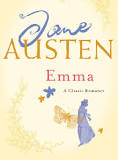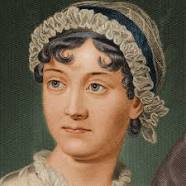Emma Page #26
Emma, by Jane Austen, is a novel about youthful hubris and the perils of misconstrued romance. The story takes place in the fictional village of Highbury and the surrounding estates of Hartfield, Randalls, and Donwell Abbey and involves the relationships among individuals in those locations consisting of "3 or 4 families in a country village". The novel was first published in December 1815 while the author was alive, with its title page listing a publication date of 1816. As in her other novels, Austen explores the concerns and difficulties of genteel women living in Georgian–Regency England; she also creates a lively comedy of manners among her characters and depicts issues of marriage, gender, age, and social status.
“A man cannot be more so,” was his short, full answer. “Ah!--Indeed I am very sorry.--Come, shake hands with me.” This had just taken place and with great cordiality, when John Knightley made his appearance, and “How d'ye do, George?” and “John, how are you?” succeeded in the true English style, burying under a calmness that seemed all but indifference, the real attachment which would have led either of them, if requisite, to do every thing for the good of the other. The evening was quiet and conversable, as Mr. Woodhouse declined cards entirely for the sake of comfortable talk with his dear Isabella, and the little party made two natural divisions; on one side he and his daughter; on the other the two Mr. Knightleys; their subjects totally distinct, or very rarely mixing--and Emma only occasionally joining in one or the other. The brothers talked of their own concerns and pursuits, but principally of those of the elder, whose temper was by much the most communicative, and who was always the greater talker. As a magistrate, he had generally some point of law to consult John about, or, at least, some curious anecdote to give; and as a farmer, as keeping in hand the home-farm at Donwell, he had to tell what every field was to bear next year, and to give all such local information as could not fail of being interesting to a brother whose home it had equally been the longest part of his life, and whose attachments were strong. The plan of a drain, the change of a fence, the felling of a tree, and the destination of every acre for wheat, turnips, or spring corn, was entered into with as much equality of interest by John, as his cooler manners rendered possible; and if his willing brother ever left him any thing to inquire about, his inquiries even approached a tone of eagerness. While they were thus comfortably occupied, Mr. Woodhouse was enjoying a full flow of happy regrets and fearful affection with his daughter. “My poor dear Isabella,” said he, fondly taking her hand, and interrupting, for a few moments, her busy labours for some one of her five children--“How long it is, how terribly long since you were here! And how tired you must be after your journey! You must go to bed early, my dear--and I recommend a little gruel to you before you go.--You and I will have a nice basin of gruel together. My dear Emma, suppose we all have a little gruel.” Emma could not suppose any such thing, knowing as she did, that both the Mr. Knightleys were as unpersuadable on that article as herself;--and two basins only were ordered. After a little more discourse in praise of gruel, with some wondering at its not being taken every evening by every body, he proceeded to say, with an air of grave reflection, “It was an awkward business, my dear, your spending the autumn at South End instead of coming here. I never had much opinion of the sea air.” “Mr. Wingfield most strenuously recommended it, sir--or we should not have gone. He recommended it for all the children, but particularly for the weakness in little Bella's throat,--both sea air and bathing.” “Ah! my dear, but Perry had many doubts about the sea doing her any good; and as to myself, I have been long perfectly convinced, though perhaps I never told you so before, that the sea is very rarely of use to any body. I am sure it almost killed me once.” “Come, come,” cried Emma, feeling this to be an unsafe subject, “I must beg you not to talk of the sea. It makes me envious and miserable;--I who have never seen it! South End is prohibited, if you please. My dear Isabella, I have not heard you make one inquiry about Mr. Perry yet; and he never forgets you.” “Oh! good Mr. Perry--how is he, sir?” “Why, pretty well; but not quite well. Poor Perry is bilious, and he has not time to take care of himself--he tells me he has not time to take care of himself--which is very sad--but he is always wanted all round the country. I suppose there is not a man in such practice anywhere. But then there is not so clever a man any where.” “And Mrs. Perry and the children, how are they? do the children grow? I have a great regard for Mr. Perry. I hope he will be calling soon. He will be so pleased to see my little ones.” “I hope he will be here to-morrow, for I have a question or two to ask him about myself of some consequence. And, my dear, whenever he comes, you had better let him look at little Bella's throat.” “Oh! my dear sir, her throat is so much better that I have hardly any uneasiness about it. Either bathing has been of the greatest service to her, or else it is to be attributed to an excellent embrocation of Mr. Wingfield's, which we have been applying at times ever since August.” “It is not very likely, my dear, that bathing should have been of use to her--and if I had known you were wanting an embrocation, I would have spoken to-- “You seem to me to have forgotten Mrs. and Miss Bates,” said Emma, “I have not heard one inquiry after them.” “Oh! the good Bateses--I am quite ashamed of myself--but you mention them in most of your letters. I hope they are quite well. Good old Mrs. Bates--I will call upon her to-morrow, and take my children.--They are always so pleased to see my children.--And that excellent Miss Bates!--such thorough worthy people!--How are they, sir?” “Why, pretty well, my dear, upon the whole. But poor Mrs. Bates had a bad cold about a month ago.” “How sorry I am! But colds were never so prevalent as they have been this autumn. Mr. Wingfield told me that he has never known them more general or heavy--except when it has been quite an influenza.” “That has been a good deal the case, my dear; but not to the degree you mention. Perry says that colds have been very general, but not so heavy as he has very often known them in November. Perry does not call it altogether a sickly season.” “No, I do not know that Mr. Wingfield considers it very sickly except-- “Ah! my poor dear child, the truth is, that in London it is always a sickly season. Nobody is healthy in London, nobody can be. It is a dreadful thing to have you forced to live there! so far off!--and the air so bad!” “No, indeed--we are not at all in a bad air. Our part of London is very superior to most others!--You must not confound us with London in general, my dear sir. The neighbourhood of Brunswick Square is very different from almost all the rest. We are so very airy! I should be unwilling, I own, to live in any other part of the town;--there is hardly any other that I could be satisfied to have my children in: but we are so remarkably airy!--Mr. Wingfield thinks the vicinity of Brunswick Square decidedly the most favourable as to air.” “Ah! my dear, it is not like Hartfield. You make the best of it--but after you have been a week at Hartfield, you are all of you different creatures; you do not look like the same. Now I cannot say, that I think you are any of you looking well at present.”
Translation
Translate and read this book in other languages:
Select another language:
- - Select -
- 简体中文 (Chinese - Simplified)
- 繁體中文 (Chinese - Traditional)
- Español (Spanish)
- Esperanto (Esperanto)
- 日本語 (Japanese)
- Português (Portuguese)
- Deutsch (German)
- العربية (Arabic)
- Français (French)
- Русский (Russian)
- ಕನ್ನಡ (Kannada)
- 한국어 (Korean)
- עברית (Hebrew)
- Gaeilge (Irish)
- Українська (Ukrainian)
- اردو (Urdu)
- Magyar (Hungarian)
- मानक हिन्दी (Hindi)
- Indonesia (Indonesian)
- Italiano (Italian)
- தமிழ் (Tamil)
- Türkçe (Turkish)
- తెలుగు (Telugu)
- ภาษาไทย (Thai)
- Tiếng Việt (Vietnamese)
- Čeština (Czech)
- Polski (Polish)
- Bahasa Indonesia (Indonesian)
- Românește (Romanian)
- Nederlands (Dutch)
- Ελληνικά (Greek)
- Latinum (Latin)
- Svenska (Swedish)
- Dansk (Danish)
- Suomi (Finnish)
- فارسی (Persian)
- ייִדיש (Yiddish)
- հայերեն (Armenian)
- Norsk (Norwegian)
- English (English)
Citation
Use the citation below to add this book to your bibliography:
Style:MLAChicagoAPA
"Emma Books." Literature.com. STANDS4 LLC, 2025. Web. 8 Jan. 2025. <https://www.literature.com/book/emma_29>.




Discuss this Emma book with the community:
Report Comment
We're doing our best to make sure our content is useful, accurate and safe.
If by any chance you spot an inappropriate comment while navigating through our website please use this form to let us know, and we'll take care of it shortly.
Attachment
You need to be logged in to favorite.
Log In